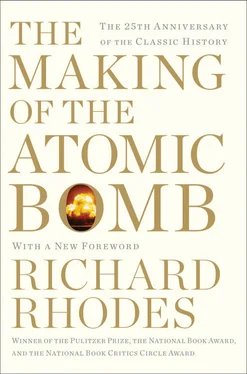Just then, in 1932, Szilard found or took up for the first time that appealing orphan among H. G. Wells’ books that he had failed to discover before: The World Set Free. 63Despite its title, it was not a tract like The Open Conspiracy. It was a prophetic novel, published in 1914, before the beginning of the Great War. Thirty years later Szilard could still summarize The World Set Free in accurate detail. Wells describes, he says:
…the liberation of atomic energy on a large scale for industrial purposes, the development of atomic bombs, and a world war which was apparently fought by an alliance of England, France, and perhaps including America, against Germany and Austria, the powers located in the central part of Europe. He places this war in the year 1956, and in this war the major cities of the world are all destroyed by atomic bombs. 64
More personal discoveries emerged from Wells’ visionary novel—ideas that anticipated or echoed Szilard’s utopian plans, responses that may have guided him in the years ahead. Wells writes that his scientist hero, for example, was “oppressed, he was indeed scared, by his sense of the immense consequences of his discovery. He had a vague idea that night that he ought not to publish his results, that they were premature, that some secret association of wise men should take care of his work and hand it on from generation to generation until the world was riper for its practical application.” 65
Yet The World Set Free influenced Szilard less than its subject matter might suggest. “This book made a very great impression on me, but I didn’t regard it as anything but fiction. It didn’t start me thinking of whether or not such things could in fact happen. I had not been working in nuclear physics up to that time.” 66
By his own account, a different and quieter dialogue changed the direction of Szilard’s work. The friend who had introduced him to H. G. Wells returned in 1932 to the Continent:
I met him again in Berlin and there ensued a memorable conversation. Otto Mandl said that now he really thought he knew what it would take to save mankind from a series of ever-recurring wars that could destroy it. He said that Man has a heroic streak in himself. Man is not satisfied with a happy idyllic life: he has the need to fight and to encounter danger. And he concluded that what mankind must do to save itself is to launch an enterprise aimed at leaving the earth. On this task he thought the energies of mankind could be concentrated and the need for heroism could be satisfied. 67I remember very well my own reaction. I told him that this was somewhat new to me, and that I really didn’t know whether I would agree with him. The only thing I could say was this: that if I came to the conclusion that this was what mankind needed, if I wanted to contribute something to save mankind, then I would probably go into nuclear physics, because only through the liberation of atomic energy could we obtain the means which would enable man not only to leave the earth but to leave the solar system.
Such must have been Szilard’s conclusion; that year he moved to the Harnack House of the Kaiser Wilhelm Institutes—a residence for visiting scientists sponsored by German industry, a faculty club of sorts—and approached Lise Meitner about the possibility of doing experimental work with her in nuclear physics. Thus to save mankind. 68
He always lived out of suitcases, in rented rooms. At the Harnack House he kept the keys to his two suitcases at hand and the suitcases packed. “All I had to do was turn the key and leave when things got too bad.” Things got bad enough to delay a decision about working with Meitner. An older Hungarian friend, Szilard remembers—Michael Polanyi, a chemist at the Kaiser Wilhelm Institutes with a family to consider—viewed the German political scene optimistically, like many others in Germany at the time. 69, 70“They all thought that civilized Germans would not stand for anything really rough happening.” Szilard held no such sanguine view, noting that the Germans themselves were paralyzed with cynicism, one of the uglier effects on morals of losing a major war. 71
Adolf Hitler was appointed Chancellor of Germany on January 30, 1933. On the night of February 27 a Nazi gang directed by the head of the Berlin SA, Hitler’s private army, set fire to the imposing chambers of the Reichstag. The building was totally destroyed. Hitler blamed the arson on the Communists and bullied a stunned Reichstag into awarding him emergency powers. Szilard found Polanyi still unconvinced after the fire. “He looked at me and said, ‘Do you really mean to say that you think that [Minister] of the Interior [Hermann Göring] had anything to do with this?’ and I said, ‘Yes, this is precisely what I mean.’ He just looked at me with incredulous eyes.” In late March, Jewish judges and lawyers in Prussia and Bavaria were dismissed from practice. 72On the weekend of April 1, Julius Streicher directed a national boycott of Jewish businesses and Jews were beaten in the streets. “I took a train from Berlin to Vienna on a certain date, close to the first of April, 1933,” Szilard writes. “The train was empty. The same train the next day was overcrowded, was stopped at the frontier, the people had to get out, and everybody was interrogated by the Nazis. 73This just goes to show that if you want to succeed in this world you don’t have to be much cleverer than other people, you just have to be one day earlier.”
The Law for the Restoration of the Career Civil Service was promulgated throughout Germany on April 7 and thousands of Jewish scholars and scientists lost their positions in German universities. From England, where he landed in early May, Szilard went furiously to work to help them emigrate and to find jobs for them in England, the United States, Palestine, India, China and points between. If he couldn’t yet save all the world, he could at least save some part of it.
He came up for air in September. By then he was living at the Imperial Hotel in Russell Square, having transferred £1,595 from Zurich to his bank in London. 74More than half the money, £854, he held in trust for his brother Béla; the rest would see him through the year. 75Szilard’s funds came from his patent licenses, refrigeration consulting and Privatdozent fees. He was busy finding jobs for others and couldn’t be bothered to seek one himself. He had few expenses in any case; a week’s lodging and three meals a day at a good London hotel cost about £5.5; he was a bachelor most of his life and his needs were simple.
“I was no longer thinking about this conversation [with Otto Mandl about space travel], or about H. G. Wells’ book either, until I found myself in London about the time of the British Association [meeting].” 76Szilard’s syntax slips here: the crucial word is until. He had been too distracted by events and by rescue work to think creatively about nuclear physics. He had even been considering going into biology, a radical change of field but one that a number of able physicists have managed, in prewar days and since. Such a change is highly significant psychologically and Szilard was to make it in 1946. But in September 1933, a meeting of the British Association for the Advancement of Science, an annual assembly, intervened.
If on Friday, September 1, lounging in the lobby of the Imperial Hotel, Szilard read The Times’ review of The Shape of Things to Come , then he noticed the anonymous critic’s opinion that Wells had “attempted something of the sort on earlier occasions—that rather haphazard work, The World Set Free,’ comes particularly to mind—but never with anything like the same continuous abundance and solidity of detail, or indeed, the power to persuade as to the terrifying probability of some of the more immediate and disastrous developments.” And may have thought again of the atomic bombs of Wells’ earlier work, of Wells’ Open Conspiracy and his own, of Nazi Germany and its able physicists, of ruined cities and general war. 77
Читать дальше












